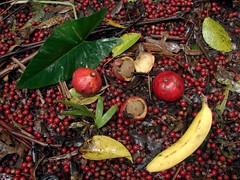Flashcards
AP World Chapter 2 Flashcards
| 12739249841 | Agricultural Revolution | Also known as the Neolithic Revolution, this is the transformation of human (and world) existence caused by the deliberate cultivation of particular plants and the deliberate taming and breeding of particular animals. |  | 0 |
| 12739249842 | Austronesian | An Asian-language family whose speakers gradually became the dominant culture of the Philippines, Indonesia, and the Pacific islands, thanks to their mastery of agriculture | 1 | |
| 12739249843 | Banpo | A Chinese archaeological site, where the remains of a significant Neolithic village have been found. |  | 2 |
| 12739249844 | Bantu | An African-language family whose speakers gradually became the dominant culture of eastern and southern Africa, thanks to their agricultural techniques and their iron-working skills |  | 3 |
| 12739249845 | Bantu migration | The spread of Bantu-speaking peoples from their homeland in what is now southern Nigeria or Cameroon to most of Africa, in a process that started ca. 3000 BCE and continued for several millennia. | 4 | |
| 12739249846 | broad spectrum diet | Archaeologists' term for the diet of gathering and hunting societies which included a wide array of plants and animals. |  | 5 |
| 12739249847 | Cahokia | An important agricultural chiefdom of North America that flourished around 1100 CE. |  | 6 |
| 12739249848 | Catalhuyuk | A important Neolithic site in what is now Turkey |  | 7 |
| 12739249849 | chiefdom | a societal grouping governed by a chief who typically relies on generosity, ritual status, or charisma rather than force to win obedience from the people. |  | 8 |
| 12739249850 | diffusion | the gradual spread of agricultural techniques without extensive population movement. | 9 | |
| 12739249851 | domestication | the taming and changing of nature for the benefit of humankind |  | 10 |
| 12739249852 | end of the last Ice Age | A process of global warming that began around 16,000 years ago and ended about 5,000 years later, with the earth enjoying a climate similar to that of our own time; this changed the conditions for human beings, leading to increased population and helping pave the way for agriculture | 11 | |
| 12739249853 | Fertile Crescent | Region sometimes known as Southwest Asia that includes the modern states of Iraq, Syria, Israel/Palestine, and southern Turkey, the earliest home of agriculture |  | 12 |
| 12739249854 | horticulture | Hoe-based agriculture, typical of early agrarian societies | 13 | |
| 12739249855 | intensification | the process of getting more in return for less; for example, growing more food on a smaller plot of land. | 14 | |
| 12739249856 | Jericho | Site of an important early agricultural settlement of perhaps 2,000 people in present-day Israel |  | 15 |
| 12739249857 | Mesopotamia | The valley of the Tigris and Euphrates rivers in present-day Iraq |  | 16 |
| 12739249858 | native Australians | Often called "Aboriginals" the natives of Australia continued to live by gathering and hunting, despite the transition to agriculture in nearby lands |  | 17 |
| 12739249859 | pastoral society | A human society that relies on domesticated animals rather than plants as the main source of food; pastoral nomads lead their animals to seasonal grazing grounds rather than settling permanently in a single location. |  | 18 |
| 12739249860 | secondary products revolution | A term used to describe the series of technological changes that began ca. 2000 BCE as people began to develop new uses for their domesticated animals, exploiting a revolutionary new source of power |  | 19 |
| 12739249861 | stateless societies | Village-based agricultural societies, usually organized by kinship groups, that functioned without a formal government apparatus | 20 | |
| 12739249862 | teosinte | The wild ancestor of maiz (corn) |  | 21 |
| 12739249863 | Neolithic Revolution | a turning point in the stone age when some humans began farming |  | 22 |
| 12739249864 | Chariot | A wheeled, horse-drawn cart used in battle |  | 23 |
| 12739249865 | Millet | A type of grain first domesticated in China |  | 24 |
| 12739249866 | Sorghum | A tall grass whose seeds are used as grain and to make syrup (native to Australia and Africa) |  | 25 |
| 12739249867 | Cattle | First domesticated in the Sudan and Saharan region (which was covered in grass between 10,000 and 5,000 years ago) |  | 26 |
| 12739249868 | Teff | A tiny, nutritious grain (and relative of the banana) which was domesticated in the eastern Saharan region |  | 27 |
| 12739249869 | West African Agriculture | Farming in the Western African region around the Niger river which involved yam, oil palm, okra, and the kola nut | 28 | |
| 12739249870 | Llama/alpaca | Descendants of camels, these animals were the only large animals native to the Americas that were domesticated |  | 29 |
| 12739249871 | metallurgy | The science and technology of metals |  | 30 |
| 12739249872 | pastoralism | A type of agricultural activity based on nomadic animal husbandry or the raising of livestock to provide food, clothing, and shelter |  | 31 |
| 12739249873 | Tiv | An African group in central Nigeria that enforced rules and maintained order without going to war. | 32 |
AP Psychology- Intelligence Flashcards
Advanced Placement Psychology
| 13633738216 | intelligence test | a method for assessing an individual's mental aptitudes and comparing them with those of others, using numerical scores. |  | 0 |
| 13633738217 | intelligence | mental quality consisting of the ability to learn from experience, solve problems, and use knowledge to adapt to new situations. it is one's potential, not what they achieve. |  | 1 |
| 13633738218 | general intelligence | according to Spearman and others, this underlies specific mental abilities and is therefore measured by every task on an intelligence test. |  | 2 |
| 13633738219 | factor analysis | a statistical procedure that identifies clusters of related items (called factors) on a test; used to identify different dimensions of performance that underlie a person's total score. |  | 3 |
| 13633738220 | savant syndrome | a condition in which a person otherwise limited in mental ability has an exceptional specific skill, such as in computation or drawing. |  | 4 |
| 13633738221 | emotional intelligence | the ability to perceive, understand, manage, and use emotions. Daniel Goleman developed a theory concerning it that focused on the importance of self control, empathy, and awareness of one's own emotions. |  | 5 |
| 13633738222 | mental age | The average age at which children could successfully answer a particular level of questions. a measure of intelligence devised by Binet; the age at which a person is mentally performing at. It can be higher, lower, or the same as their chronological age. |  | 6 |
| 13633738223 | Stanford-Binet | the widely used American revision of Binet's original intelligence test. Louis Terman of Stanford University created it. |  | 7 |
| 13633738224 | intelligence quotient (IQ) | Originally defined as the mental age divided by chronological age multiplied by 100 Developed by Louis Terman. |  | 8 |
| 13633738225 | achievement tests | tests designed to assess what a person has learned. The AP Psychology Exam is an example |  | 9 |
| 13633738226 | aptitude tests | tests designed to predict a person's future performance; aptitude is the capacity to learn. SAT, and IQ test are examples |  | 10 |
| 13633738227 | Wechsler Adult Intelligence Scale (WAIS) | the most widely used intelligence test; contains verbal and performance (nonverbal) subtests. |  | 11 |
| 13633738228 | standardization | The process of giving the test to a large group of representative and randomly selected people to establish consistent methods administration. |  | 12 |
| 13633738229 | normal curve | a symmetrical, bell-shaped curve that describes the distribution of many types of data; most scores fall near the mean (68 percent fall within one standard deviation of it) and fewer and fewer near the extremes. |  | 13 |
| 13633738230 | reliability | the extent to which a test yields consistent results. a test can be reliable but not valid. Can determine by retesting or by comparing the consistency of scores on two halves of the test (split half reliability) |  | 14 |
| 13633738231 | validity | the extent to which a test measures or predicts what it is supposed to. In order for a test to be valid it has to be reliable. |  | 15 |
| 13633738232 | content validity | the extent to which a test samples the behavior that is of interest. The AP Psychology exam will measure your knowledge of Psychology, and not Chemistry. |  | 16 |
| 13633738233 | predictive validity | the success with which a test predicts the behavior it is designed to predict; it is assessed by computing the correlation between test scores and the criterion behavior. The SATs have predictive validity. |  | 17 |
| 13633738234 | intellectual disability | (formerly referred to as mental retardation) a condition of limited mental ability, indicated by an intelligence score of 70 or below and difficulty in adapting to the demands of life; varies from mild to profound. |  | 18 |
| 13633738235 | Howard Garnder | Developed the theory of Multiple Intelligences |  | 19 |
| 13633738236 | Louis Terman | Pioneer in the field of intelligence. Conducted the famous "termite" study, also created the Stanford-Binet test and the IQ formula. |  | 20 |
| 13633738237 | Terman's Termites | Landmark longitudinal study on intelligence that put to rest many myths regarding genius |  | 21 |
| 13633738238 | Robert Sternberg | Developed the Triarchic Theory of Intelligence |  | 22 |
| 13633738239 | Alfred Binet | Created the first known intelligence test and developed the concept of mental age. |  | 23 |
| 13633738240 | David Wechsler | Created what is today the most popular IQ test. |  | 24 |
| 13633738241 | Multiple Intelligences | Theory created by Howard Gardner that there are many types of intelligences such as musical, interpersonal, naturalist, and bodily-kinetics. Come critics say these are more abilities than intelligences |  | 25 |
| 13633738242 | Triarchic Theory | Robert Sternberg's theory that intelligence is composed of Analytic Intelligence, Creative Intelligence, and Practical Intelligence. |  | 26 |
| 13633738243 | Charles Spearman | Saw intelligence as being composed of the g factor (ability to reason and solve problems) and the s factor (specific intelligence) |  | 27 |
| 13633738244 | Deviation IQ Scores | Replaced the old IQ formula. IQ scores are now determined based on a normal curve with a mean of 100 and a standard deviation of 15. |  | 28 |
| 13633738245 | Cultural bias | Tendency for IQ tests to reflect the language, culture, history, and customs of the people who designed the test. |  | 29 |
| 13633738246 | heritability | Proportion of change that is due to genetic factors. For intelligence, it is about 50%. Estimates of heritability apply to groups, not individuals. |  | 30 |
| 13633738247 | stereotype threat | just being aware of negative stereotypes that apply to your group can negatively impact your performance on intelligence tests |  | 31 |
| 13633738248 | Noam Chomsky | Linguist who theorized that humans are born with the innate ability to understand and produce language. The complexities of language are hard wired in us |  | 32 |
| 13633738249 | B.F. Skinner | Believed that language was acquired through imitation and reinforcement. | 33 | |
| 13633738250 | Critical Period Hypothesis | Theory that if one's Language Acquisition Device is not activated withing the first few years of life, the person will never fully acquire language. Likewise, if a second language is not introduced before puberty, the person's acquisition will be limited and they will speak that language with an accent. |  | 34 |
| 13633738251 | Flynn Effect | Idea that over the course of history, intelligence has increased due to factors such as better diet and health and technological advancements. |  | 35 |
AP Lit Challenging Terms Flashcards
| 11303891028 | lyre | a greek stringed instrument; predecessor to the harp |  | 0 |
| 11303897809 | Consonance | the repetition of consonant sounds in a series of words |  | 1 |
| 11303906683 | masculine rhyme | A rhyme ending on the final stressed syllable |  | 2 |
| 11303913989 | Femenine Rhyme | A rhyme with the final syllables unstressed | 3 | |
| 11303934751 | Enjambment | the continuation of a sentence without a pause beyond the end of a line, couplet, or stanza. |  | 4 |
| 11303937881 | spectral | of or like a ghost |  | 5 |
| 11303960037 | Assonance | Repetition of vowel sounds |  | 6 |
| 11303964547 | sardonic | grimly mocking or cynical |  | 7 |
| 11657508239 | Conceit | extended metaphor |  | 8 |
| 11657517728 | Iamb | a metrical foot consisting of one short (or unstressed) syllable followed by one long (or stressed) syllable. |  | 9 |
| 11657523675 | iambic pentameter | a line of verse with five metrical feet, each consisting of one short (or unstressed) syllable followed by one long (or stressed) syllable |  | 10 |
| 11657552209 | invocation | a call (usually upon a higher power) for assistance, support, or inspiration |  | 11 |
| 11657559641 | Apostrophe | a figure of speech in which one directly addresses an absent or imaginary person, or some abstraction |  | 12 |
| 11657565236 | arcane | understood by few; mysterious or secret |  | 13 |
| 11657570913 | explicit metaphor | directly equates the comparison in the metaphor |  | 14 |
| 11657581059 | Exact/True/Perfect Rhyme | When the stressed vowel sound in both words must be identical, as well as any subsequent sounds. |  | 15 |
| 11657587875 | slant/half rhyme | imperfect, approximate rhyme (ex. "sea" and "beak" "rain" and "again") |  | 16 |
| 11657594343 | inchoate | not fully formed; disorganized |  | 17 |
| 11657598885 | internal rhyme | a rhyme involving a word in the middle of a line and another at the end of the line or in the middle of the next. |  | 18 |
| 11657612969 | disseminate | to scatter or spread widely |  | 19 |
| 11657612970 | polemical | causing debate or argument |  | 20 |
| 11657618143 | irreparable | incapable of being repaired |  | 21 |
| 11657618144 | falliable | capable of being wrong, mistaken, or inaccurate |  | 22 |
| 11657622884 | self-deprecating | modest about or critical of oneself, especially humorously so |  | 23 |
| 11657622885 | acerbic | biting, bitter in tone or taste, sharp |  | 24 |
| 12309528556 | terza rima | "3 rhyme" 3 lines, scheme is aba, bcb |  | 25 |
| 12309544914 | heroic couplet | 2 lines in iambic pentameter, with lofty language |  | 26 |
| 12309556493 | fastidious | very attentive to and concerned about accuracy and detail |  | 27 |
| 12368452623 | Allegory | A song, story or poem that represents something else | 28 | |
| 12368456743 | Anectdote | brief story about an interesting event, narrative |  | 29 |
| 12368459240 | Apostrophe | address to an absent or imaginary person |  | 30 |
| 12368467852 | Asyndeton | lack of conjunctions |  | 31 |
| 12368482260 | Anaphora | the repetition of a word or phrase at the beginning of successive clauses |  | 32 |
| 12368490533 | incorrigible | difficult to change |  | 33 |
| 12368497407 | laudatory | expressing praise |  | 34 |
| 12368503253 | valiant | brave, courageous |  | 35 |
| 12368507156 | temerity | rashness, boldness |  | 36 |
| 12368509611 | wistfulness | having or showing a feeling of vague or regretful longing |  | 37 |
| 12489065396 | mercer | A dealer of fabrics and fine materials |  | 38 |
| 12489073233 | solicitous | showing interest, care, or concern |  | 39 |
| 12489078284 | officious | intrusively helpful |  | 40 |
| 12489085271 | cloying | sickly sweet; excessive |  | 41 |
| 12489089227 | vigilant | watchful |  | 42 |
| 12489089228 | obsequious | overly submissive and eager to please |  | 43 |
| 12489093101 | perturbed | anxious or unsettled; upset |  | 44 |
| 12489103240 | incredulous | skeptical, doubtful |  | 45 |
| 12489107080 | disillusioned | disappointed |  | 46 |
| 12489107081 | bemused | lost in thought |  | 47 |
| 12489110883 | ingratiate | to gain another's favor by flattery or false friendliness |  | 48 |
| 12489116543 | interior monologue | a piece of writing expressing a character's inner thoughts |  | 49 |
| 12489128875 | stream of consciousness | A literary technique that presents the thoughts and feelings of a character as they occur. |  | 50 |
| 12489139204 | missive | a long, official letter |  | 51 |
| 12489142741 | underscore | (v) emphasize (or, literally, to underline text) |  | 52 |
| 12489146025 | obtuse | annoyingly insensitive or slow to understand | 53 | |
| 12549742219 | morose | sullen and ill-tempered |  | 54 |
| 12549745429 | surreptitious | secret, stealthy |  | 55 |
| 12549750710 | philanderer | one who engages in love affairs lightly or insincerely |  | 56 |
| 12549754811 | penurious | destitute, poor |  | 57 |
| 12549759219 | libidinous | lustful | 58 | |
| 12549762693 | meek | quiet, gentle, and easily imposed on; submissive. |  | 59 |
| 12549762694 | astute | (adj.) shrewd, crafty, showing practical wisdom |  | 60 |
| 12549766747 | ardor | enthusiasm or passion |  | 61 |
| 12549779176 | venality | openness to bribery or corruption |  | 62 |
| 12549782249 | Oxymoron | two words or phrases juxtaposed with one another that seem to contradict each other |  | 63 |
| 12549794794 | Paradox | an idea that seems to contradict itself |  | 64 |
| 12549802052 | Colloquialism | the use of ordinary or familiar words or phrases in a particular area |  | 65 |
| 12549811963 | malapropism | a word humorously misused |  | 66 |
| 12549824418 | slander | False charges and malicious oral statements about someone |  | 67 |
| 12549832054 | amorous | sexual desire | 68 | |
| 12549835848 | ambivalent | having mixed feelings or contradictory ideas about something or someone | 69 | |
| 12549843472 | wily | skilled at deceit and gaining an advantage | 70 | |
| 12549856131 | guileful | deceitful, cunning, sly | 71 | |
| 12549858747 | unrequited | not returned |  | 72 |
| 12639347741 | Protagonist | Main character in a story |  | 73 |
| 12639347743 | magnanimous | generous in forgiving | 74 | |
| 12639350952 | acrimonious | angry and bitter | 75 | |
| 12639373095 | dispassionate | unemotional | 76 | |
| 12639381566 | euphony | beautiful sound |  | 77 |
| 12639388842 | grandiloquent | pompous or high-flown in speech | 78 | |
| 12639402821 | provincial | narrow-minded | 79 | |
| 12639402822 | tenuous | weak |  | 80 |
| 12862228740 | mitigate | to make less severe |  | 81 |
| 12862241544 | discernment | the ability to judge well | 82 | |
| 12862241545 | excoriate | to criticize severely | 83 | |
| 12862245403 | boon | a gift or blessing |  | 84 |
| 12862248673 | hapless | unfortunate |  | 85 |
| 12862252572 | unfettered | free, unrestrained |  | 86 |
| 12862267544 | temerity | rashness, boldness | 87 | |
| 12862271468 | resilience | the ability to recover quickly |  | 88 |
| 12862278714 | timorous | timid |  | 89 |
| 12862281571 | resolute | determined |  | 90 |
| 12862287157 | penitent | regretful |  | 91 |
| 13031591658 | Immutability | unable to change |  | 92 |
| 13031597255 | mutability | ability to change |  | 93 |
| 13031605039 | Variability | the ability to change; lack of consistency |  | 94 |
| 13031615892 | Epistrophe | Repetition of the same word or group of words at the ends of successive clauses |  | 95 |
| 13031622333 | Chiasmus | A statement consisting of two parallel parts in which the second part is structurally reversed |  | 96 |
| 13031625263 | Antithesis | Direct opposite |  | 97 |
| 13031640477 | droll | dryly amusing |  | 98 |
| 13031670027 | Eschatology | the theology of the end of the age |  | 99 |
| 13031678211 | Cosmogony | A theory of the origin of the universe |  | 100 |
| 13031683855 | Teleology | the study of design or purpose in natural phenomena |  | 101 |
| 13031690074 | Hermeneutics | the branch of knowledge that deals with interpretation, especially of the Bible or literary texts. |  | 102 |
| 13031694800 | apostasy | rejection of faith |  | 103 |
| 13031698526 | ephemeral | short-lived |  | 104 |
| 13031701691 | theism | belief in a god or gods |  | 105 |
| 13031718741 | Atheism | The denial of the existence of God |  | 106 |
| 13031723312 | Deism | belief in a supreme being that does not interfere |  | 107 |
| 13031736640 | Agnosticism | Not being sure whether God exists |  | 108 |
| 13031740061 | Animism | the attribution of a soul to plants, inanimate objects and natural phenomena | 109 | |
| 13127555461 | anachronism | something out of place in time |  | 110 |
| 13127560545 | ode | A poem that celebrates a person or thing |  | 111 |
| 13127609407 | Ballad | a poem that tells a story |  | 112 |
| 13127613107 | Sonnet | 14 line poem that rhymes |  | 113 |
| 13127618978 | admonition | warning |  | 114 |
| 13127622162 | Lyric | a musical and emotional poem |  | 115 |
| 13127626267 | vehement | passionate |  | 116 |
| 13127629646 | maudlin | overly sentimental |  | 117 |
| 13127632683 | ephermal | short-lived |  | 118 |
| 13217641514 | Diction | word choice | 119 | |
| 13217682126 | fatalistic | believing that all events in life are inevitable and determined by fate |  | 120 |
| 13546270259 | Overture | introduction to a poem | 121 | |
| 13546272953 | denouement | the final part of a story that ties up all loose ends | 122 | |
| 13546283754 | Coda | concluded event or remarks of a poem, an epilougue | 123 | |
| 13546291643 | Appositive | the fat of a sentenfe | 124 | |
| 13546295804 | epithet | title or nickname |  | 125 |
| 13546299625 | reticent | hesitant |  | 126 |
| 13546303497 | admonishing | warning |  | 127 |
| 13546307255 | conciliatory | trying to keep one from anger |  | 128 |
| 13546309565 | iamb | unstressed, stressed | 129 | |
| 13546315143 | Trochee | stressed, unstressed | 130 | |
| 13546320118 | slant rhyme | A rhyming sound that is not exact. |  | 131 |
| 13546325991 | Caesura | dramatic pause | 132 | |
| 13546350139 | refrain | A line or set of lines repeated several times over the course of a poem. | 133 | |
| 13546359079 | indifferent | Having no preference |  | 134 |
| 13546363124 | ambivalence | mixed feelings or emotions |  | 135 |
| 13546369899 | coy | shy | 136 | |
| 13546369900 | em dash | denotes a pause | 137 | |
| 13546372584 | parallelism | similarity of structure in a pair or series of related words, phrases, or clauses | 138 | |
| 13631901380 | Anastrophe | Inversion of the natural or usual word order |  | 139 |
| 13631903859 | mercurial | moody |  | 140 |
| 13631906511 | santimonious | pretending to be righteous |  | 141 |
| 13631910736 | promiscuous | loose, sexually uncontrolled | 142 |
Flashcards
Flashcards
Flashcards
Flashcards
AP World History Countries Flashcards
| 14801129262 | United States |  | 0 | |
| 14801129263 | Mexico |  | 1 | |
| 14801129264 | Cuba |  | 2 | |
| 14801129265 | Nicaragua |  | 3 | |
| 14801129266 | Haiti |  | 4 | |
| 14801129267 | Peru |  | 5 | |
| 14801129268 | Brazil |  | 6 | |
| 14801129269 | Argentina |  | 7 | |
| 14801129270 | South Africa |  | 8 | |
| 14801129271 | Zimbabwe |  | 9 | |
| 14801129272 | Angola |  | 10 | |
| 14801129273 | Tanzania |  | 11 | |
| 14801129274 | Ghana |  | 12 | |
| 14801129275 | Nigeria |  | 13 | |
| 14801129276 | Ethiopia |  | 14 | |
| 14801129277 | Senegal |  | 15 | |
| 14801129278 | Mali |  | 16 | |
| 14801129279 | Algeria |  | 17 | |
| 14801129280 | Egypt |  | 18 | |
| 14801129281 | Portugal |  | 19 | |
| 14801129282 | Spain |  | 20 | |
| 14801129283 | France |  | 21 | |
| 14801129284 | U.K. |  | 22 | |
| 14801129285 | Netherlands |  | 23 | |
| 14801129286 | Germany |  | 24 | |
| 14801129287 | Italy |  | 25 | |
| 14801129288 | Turkey |  | 26 | |
| 14801129289 | Iraq |  | 27 | |
| 14801129290 | Iran |  | 28 | |
| 14801129291 | Pakistan |  | 29 | |
| 14801129292 | India |  | 30 | |
| 14801129293 | Russia |  | 31 | |
| 14801129294 | Mongolia |  | 32 | |
| 14801129295 | China |  | 33 | |
| 14801129296 | Japan |  | 34 | |
| 14801129297 | Korea |  | 35 | |
| 14801129298 | Vietnam |  | 36 | |
| 14801129299 | Cambodia |  | 37 | |
| 14801129300 | Indonesia |  | 38 |
Pages
Need Help?
We hope your visit has been a productive one. If you're having any problems, or would like to give some feedback, we'd love to hear from you.
For general help, questions, and suggestions, try our dedicated support forums.
If you need to contact the Course-Notes.Org web experience team, please use our contact form.
Need Notes?
While we strive to provide the most comprehensive notes for as many high school textbooks as possible, there are certainly going to be some that we miss. Drop us a note and let us know which textbooks you need. Be sure to include which edition of the textbook you are using! If we see enough demand, we'll do whatever we can to get those notes up on the site for you!

